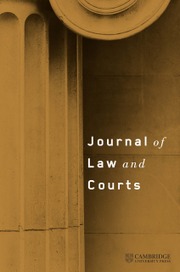No CrossRef data available.
Article contents
Doctrinal Reasoning as a Disruptive Practice
Published online by Cambridge University Press: 21 October 2022
Abstract
Legal doctrine is generally thought to contribute to legal decision-making only to the extent it determines substantive results. Yet in many cases, the available authorities are indeterminate. I propose a different model for how doctrinal reasoning might contribute to judicial decisions. Drawing on performance theory and psychological studies of readers, I argue that judges’ engagement with formal legal doctrine might have self-disrupting effects like those performers experience when they adopt uncharacteristic behaviors. Such disruptive effects would not explain how judges ultimately select, or should select, legal results. But they might help legal decision makers to set aside subjective biases.
- Type
- Research Article
- Information
- Copyright
- © 2018 by the Law and Courts Organized Section of the American Political Science Association. All rights reserved.
Footnotes
The author would like to thank Keith Bybee, Peter Gerhart, Haider ala Hamoudi, Deborah Hensler, David Klein, Jules Lobel, and the participants in the 2017 Stanford/Yale/Harvard Junior Faculty Forum for helpful comments on earlier drafts.


